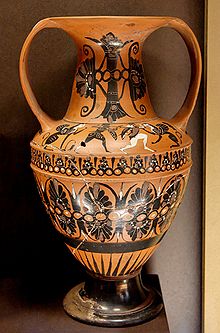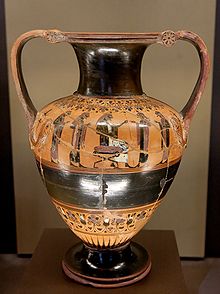- Nikosthenic amphora
-
The term Nikosthenic amphora describes a specific type[1] of Attic vase. It was invented in the late 6th century BC by the potter Nikosthenes, aimed specifically for esport to Etruria. The Nikosthenic amphora is inspired by Etruscan Bucchero types. It is the characteristic product of the Nikosthenes-Pamphaios workshop. Striking features are the angular body of the amphora and the broad flat handles. The Etruscan predecessors were black-painted, whereas the Attic vases were decorated in the black-figure style. Nearly all know examples were found in Caere, while the majority of Nikosthenes products in other shapes were discovered in Vulci. This suggests that the type was specifically made for sale in or to Caere, which indicates that Niokosthenes must have been a gifted salesmen and that an efficient system of intermediate traders must have existed. Noksothenes created or introduced several vase shapes, but the Nikosthenic amphora is his most famous innovation. The clay of the Nikosthenic amphorae is bright orange-red, and thus provides a perfect base for black.figure vase painting. Their decoration follows quite varied patterns. Sometimes, they are subdivided in two or three separate friezes, mostly of plant and animal motifs. In other cases, images cover the whole vase body. Apparently most, perhaps even all, Nikosthenic amphorae were painted by Painter N, whi has been suggested to be identical with Nikosthenes. Production began around 530m to 520 BC and continued under Nikosthenes' successor Pamphaios – at that stage in the red-figure style – to cease between 500 and 490 BC.[2]
Contents
Bibliography
- John Boardman: Schwarzfigurige Vasen aus Athen. Ein Handbuch, Mainz 1977, p. 72 (Kulturgeschichte der Antiken Welt, Vol. 1) ISBN 3-8053-0233-9
- Thomas Mannack: Griechische Vasenmalerei. Eine Einführung. Theiss, Stuttgart 2002, p. 123 ISBN 3-8062-1743-2.
- Wolfgang Schiering: Die griechischen Tongefässe. Gestalt, Bestimmung und Formenwandel. 2. Auflage. Mann, Berlin 1983, p. 37f., 46-48, 152 (Gebr.-Mann-Studio-Reihe) ISBN 3-7861-1325-4.
References
- ^ Schiering uses the term „Typus“ (type) and avoids the term “Variant“.
- ^ Production periods of different amphora shapes on Gießen University website – here wrongly classified as belly amphorae.
External links
Source of Translation
- This article incorporates information from this version of the equivalent article on the German Wikipedia.
Categories:- Ancient Greek pot shapes
Wikimedia Foundation. 2010.


